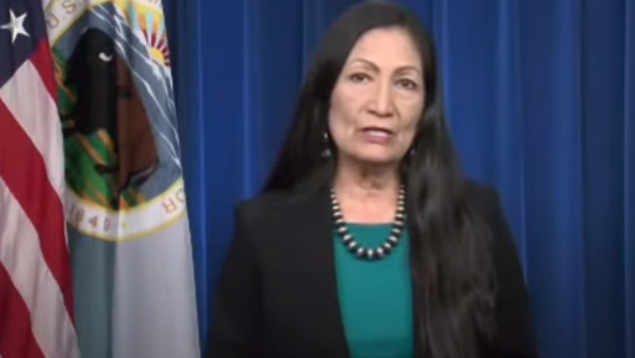Secretary of the Interior Deb Haaland (Laguna Pueblo) today, August 27, announced protections for 28 million acres of public lands across Alaska in an effort to protect cultural and subsistence resources.

Today’s action comes in response to the previous Administration’s unlawful decision in its final days to end the longstanding protections, without sufficient analysis of impacts on subsistence hunting and fishing. This sweeping action would have opened millions of acres of public lands to extractive development activities, such as mining and oil and gas drilling, and removed the federal subsistence priority from millions of acres, according to a press release from the Department of the Interior.
Under the Biden administration, the previous Administration’s decision was put on hold to allow for engagement with the public and Alaska Native communities. The public comment process gathered input from Alaska Native Tribes and Native Corporations, rural and urban communities, and the public, including 19 community meetings. During the public comment period, the Bureau of Land Management received about 15,000 public comments, and heard overwhelming support for retaining the withdrawals.
“Tribal consultation must be treated as a requirement – not an option – when the federal government is making decisions that could irrevocably affect Tribal communities. I am grateful to the team at the Bureau of Land Management for taking the time to ensure that we approached this decision with the benefit of feedback from Alaska Native communities, and to the Tribal leaders who shared with us the impact that a potential revocation of the withdrawals would have on their people,” said Secretary Deb Haaland in a statement. “Continuing these essential protections, which have been in place for decades, will ensure continued access and use of these public lands now and in the future.”
The Bureau of Land Management analyzed a set of alternatives ranging from partial to full revocation. The BLM’s analysis found that revoking any of the protections would likely harm subsistence hunting and fishing in communities that would lose federal subsistence priority over certain lands, ranging from 44 to 117 communities, depending on the alternative. The analysis also found that lifting all or even some of the withdrawals could have lasting negative impacts on wildlife, vegetation and permafrost, according to the Department of the Interior.
More Stories Like This
Native News Weekly (August 25, 2024): D.C. BriefsNavajo Nation Mourns the Passing of Former Vice President Rex Lee Jim
Deb Haaland Earns Endorsement From Communications Workers of America Local 7076
University Soccer Standout Leads by Example
Two Native Americans Named to Democratic Congressional Campaign Committee's“Red to Blue” Program
Help us defend tribal sovereignty.
At Native News Online, our mission is rooted in telling the stories that strengthen sovereignty and uplift Indigenous voices — not just at year’s end, but every single day.
Because of your generosity last year, we were able to keep our reporters on the ground in tribal communities, at national gatherings and in the halls of Congress — covering the issues that matter most to Indian Country: sovereignty, culture, education, health and economic opportunity.
That support sustained us through a tough year in 2025. Now, as we look to the year ahead, we need your help right now to ensure warrior journalism remains strong — reporting that defends tribal sovereignty, amplifies Native truth, and holds power accountable.
 The stakes couldn't be higher. Your support keeps Native voices heard, Native stories told and Native sovereignty defended.
The stakes couldn't be higher. Your support keeps Native voices heard, Native stories told and Native sovereignty defended.
Stand with Warrior Journalism today.
Levi Rickert (Potawatomi), Editor & Publisher


